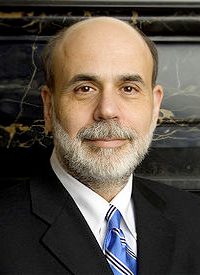
With the publishing of a “white paper” about the housing market, Fed Chairman Ben Bernanke has rankled some Republicans that suggestions made appear to have transgressed some line of propriety that separates monetary policy, fiscal policy, and the Fed’s “independence.”
The study, prepared by his staff and signed by the chairman, decried the inability of the housing market to get back on its feet despite continued efforts by both Congress and the Fed to restart it. Bernanke wrote:
The challenge for policymakers is to find ways to help reconcile the existing size and mix of the housing stock and the current environment for housing finance. Fundamentally, such measures involve adapting the existing housing stock to the prevailing tight mortgage lending conditions — for example, devising policies that could help facilitate the conversion of foreclosed properties to rental properties — or supporting a housing finance regime that is less restrictive than today’s, while steering clear of the lax standards that emerged during the last decade. Absent any policies to help bridge this gap, the adjustment process will take longer and incur more deadweight losses, pushing house prices lower and thereby prolonging the downward pressure on the wealth of current homeowners and the resultant drag on the economy at large.
This crossed the line, according to Senator Orrin Hatch (R-Utah), who wrote a scathing letter to the Fed chairman: “I worry that…your…housing white paper…treads too far into fiscal policy, and runs the risk of being perceived as advocacy for particular policy options. [This] white paper is a move in the wrong direction.” He added:
Your staff’s white paper contains a number of conjectures and proposes consideration of a number of policies that are clearly in the province of fiscal policy, including policies that would directly allocate losses to innocent taxpayers, even though those taxpayers did not undertake the risks that led to the losses.
Hatch reviewed those suggested policies which included principal write-downs (at taxpayer expense) of homeowners who are underwater which would, according to Hatch, discriminate against those who were more conservative in their borrowing for home purchases. These people who “played by the rules, put solid down payments on their homes, and chose not to overextend themselves on housing would potentially be asked to be on the hook for bailouts of more profligate borrowers.”
Bernanke isn’t the only one with lots of bright ideas about how to breathe life back into the moribund housing market. The President of the Federal Reserve Bank of New York, William Dudley, reviewed several of them in a speech to the New Jersey Bankers Association on January 8, which included “measures to improve access to mortgage credit, reduce obstacles to refinancing, lessen the flow of homes into foreclosure through bridge financing and accelerated principal reduction, and to facilitate the absorption of bank-owner real estate into use as owner- or renter-housing.”
Dudley had no problem crossing that invisible line between congressional fiscal action and Federal Reserve monetary policy, adding, “There is more to economic policy than just monetary policy…with additional housing policy interventions, we could achieve a better set of economic outcomes than with just monetary policy alone.”
Measuring that “better set of economic outcomes” has been difficult for the Federal Reserve. As Benn Steill wrote in the Wall Street Journal, the Fed’s ability to forecast the future has been dismal. On four different occasions the Fed made predictions about certain “outcomes” and four times it has missed the mark. As Steill said, “The Fed’s premise that it can speak with authority about the future is flawed. During the two decades to 2006, its own [internal] experts were worse than outside ones in predicting one-year economic data. Since the start of the crisis in 2007, its three-year predictions have been worthless.”
All of which brings up the question: if the Fed is so poor in predicting the outcomes of its own behavior, how can it have any confidence that Congress will do any better? Conversely, what confidence can Congress have that its own measures will succeed any better than what’s already been tried by the Fed? What is left out of the conversation, as always, is the necessity for the Fed to maintain its “independence” and certainly no one, not even Senator Hatch, would dare to suggest that it is precisely that “independence” which has been the root cause of most of the economy’s ills over the years. Hatch abides by the basic law of political survival: Thou shalt not question the Fed!
Instead, Bernanke himself unwittingly makes the case for getting both Congress and the Fed out of the way of the housing market. In a talk to the National Association of Homebuilders in Orlando last week, Bernanke built the case for free market solutions to the housing problem surprisingly well:
In sum, the economic recovery has been disappointing in part because U.S. housing markets remain out of balance. Many local markets have an overhang of empty and foreclosed homes, and many potentially credit worthy homebuyers cannot obtain mortgages. The weak housing market also impairs homeowners’ financial health and diminishes the quality and stability of neighborhoods and communities. For these reasons, and because the troubled housing market depresses construction activity and employment, we need to continue to develop and implement policies that will help the housing sector get back on its feet. No single solution will be sufficient. But sustained efforts to address the many interlocking factors holding back the housing market will pay dividends in the long run.
Those dividends will only appear when the free market is allowed to “address the many interlocking factors” and “develop and implement policies” necessary to the recovery. Continued application of interventionist regulatory remedies by Congress and the "independent" Fed that made the patient sick in the first place is no prescription for regaining health.



